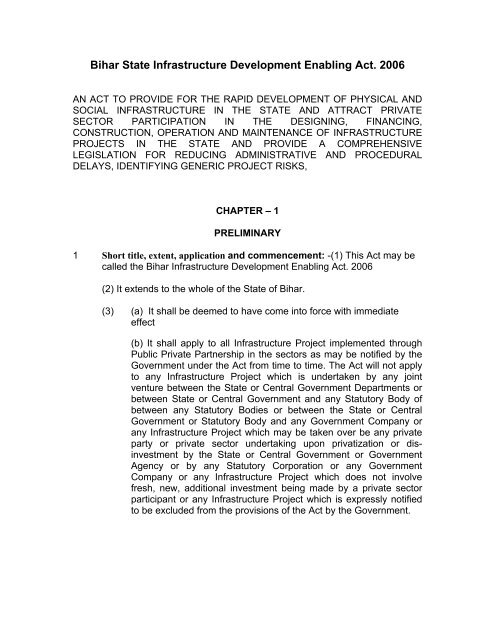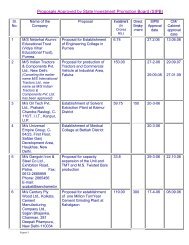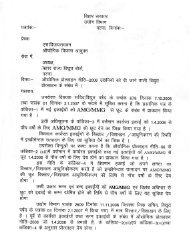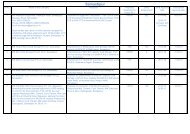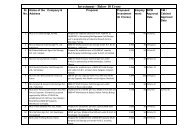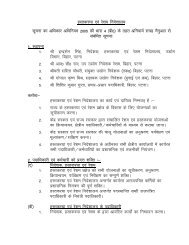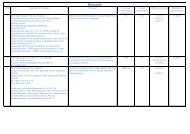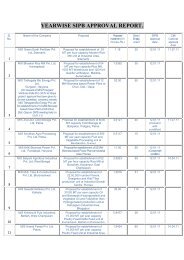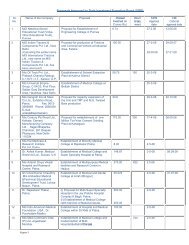Bihar State Infrastructure Development Enabling Act, 2006. - English ...
Bihar State Infrastructure Development Enabling Act, 2006. - English ...
Bihar State Infrastructure Development Enabling Act, 2006. - English ...
You also want an ePaper? Increase the reach of your titles
YUMPU automatically turns print PDFs into web optimized ePapers that Google loves.
<strong>Bihar</strong> <strong>State</strong> <strong>Infrastructure</strong> <strong>Development</strong> <strong>Enabling</strong> <strong>Act</strong>. 2006AN ACT TO PROVIDE FOR THE RAPID DEVELOPMENT OF PHYSICAL ANDSOCIAL INFRASTRUCTURE IN THE STATE AND ATTRACT PRIVATESECTOR PARTICIPATION IN THE DESIGNING, FINANCING,CONSTRUCTION, OPERATION AND MAINTENANCE OF INFRASTRUCTUREPROJECTS IN THE STATE AND PROVIDE A COMPREHENSIVELEGISLATION FOR REDUCING ADMINISTRATIVE AND PROCEDURALDELAYS, IDENTIFYING GENERIC PROJECT RISKS,CHAPTER – 1PRELIMINARY1 Short title, extent, application and commencement: -(1) This <strong>Act</strong> may becalled the <strong>Bihar</strong> <strong>Infrastructure</strong> <strong>Development</strong> <strong>Enabling</strong> <strong>Act</strong>. 2006(2) It extends to the whole of the <strong>State</strong> of <strong>Bihar</strong>.(3) (a) It shall be deemed to have come into force with immediateeffect(b) It shall apply to all <strong>Infrastructure</strong> Project implemented throughPublic Private Partnership in the sectors as may be notified by theGovernment under the <strong>Act</strong> from time to time. The <strong>Act</strong> will not applyto any <strong>Infrastructure</strong> Project which is undertaken by any jointventure between the <strong>State</strong> or Central Government Departments orbetween <strong>State</strong> or Central Government and any Statutory Body ofbetween any Statutory Bodies or between the <strong>State</strong> or CentralGovernment or Statutory Body and any Government Company orany <strong>Infrastructure</strong> Project which may be taken over be any privateparty or private sector undertaking upon privatization or disinvestmentby the <strong>State</strong> or Central Government or GovernmentAgency or by any Statutory Corporation or any GovernmentCompany or any <strong>Infrastructure</strong> Project which does not involvefresh, new, additional investment being made by a private sectorparticipant or any <strong>Infrastructure</strong> Project which is expressly notifiedto be excluded from the provisions of the <strong>Act</strong> by the Government.
22. Definitions: (a) "<strong>Act</strong>" means the <strong>Bihar</strong> <strong>Infrastructure</strong> <strong>Development</strong> <strong>Enabling</strong><strong>Act</strong>, 2006;(b) "<strong>Infrastructure</strong> Project or Project" means a Project in thesectors as notified under the <strong>Act</strong> by the Government;(c) "Government" means the <strong>State</strong> Government of <strong>Bihar</strong>;(d) "Government Agency" means any department of theGovernment or any corporation or body owned or controlled bythe Government by reason of the Government holding not lessthan fifty one percent of paid-up share capital in suchcorporation or body;(e) "Best Effort" means best efforts made in the circumstances;(f) "Bidder" means any entity including any Bidding Consortium,who has submitted a proposal to undertake an <strong>Infrastructure</strong>Project under Public private Partnership;(g) "Bidding Consortium" means if the proposal for the project ismade jointly by more than one entity, then such group of entitiesshall be referred to as a Bidding Consortium;(h) "Categories of projects" means categories specified inSchedule II of the <strong>Act</strong> and such other categories as may benotified by the Government from time to time;(i) "<strong>Infrastructure</strong>" means public works relating to infrastructurefor utilising the natural resources.(j) "Member" means a member of the <strong>Infrastructure</strong> <strong>Development</strong>Authority which includes the Chairperson, the Vice Chairperson,any other member of the <strong>Infrastructure</strong> <strong>Development</strong> Authority;(k) "Notification" means a notification published in the <strong>Bihar</strong>Gazette and the word "notified" shall be construed accordingly;(l) "Person" Shall include any company or association or body ofindividuals, whether incorporated or not;(m) "Charges for Abuse or Abuser Charges" means the levy ofcharges by the <strong>Infrastructure</strong> <strong>Development</strong> Authority on anyDeveloper, if any Developer abuses any right accorded underthe Concession Agreement, in the course of development,implementation, operation, maintenance, management andtransfer of any infrastructure Project, to the extent as may bespecified in the Concession Agreement or such otheragreement as may be prescribed by the Government;(n) "Company" means any entity incorporated by memorandumof association under the Companies <strong>Act</strong>, 1956 or incorporatedunder any other statute or deemed to be incorporated under thelaws of India or the laws of any other country of the World;
4(x) "Public Private Partnership" means investment by privateSector Participant in an <strong>Infrastructure</strong> Project of the GovernmentAgency or the Local Authority in the <strong>State</strong>;(y) "Regulations" means regulations made under section 66 ofthe <strong>Act</strong>;(z) "Responsive Bid" means a bid from an eligible Bidder whichcomplies with all the requirements prescribed by the tenderdocuments or other documents as the case may be;(aa) "Rules" means rules made under section 67 of the <strong>Act</strong>;(bb)"Local Authority" means any municipal corporation ormurnicipal council or any panchayat or any other statutory bodyformed, elected or appointed for local self-Government;(cc) "Construction" means any construction reconstruction,rehabilitation, improvement, expansion addition, alteration andrelated works and activities including supply of any equipment,materials, labour and service related to build or rehabilitate anyinfrastructure Project comprising of physcial structures orsystems or commodities or for utilization or resources orprovision of services;(dd) 'Sectors' means sectors as notified under Schedule III of the<strong>Act</strong> and as may be notified from time to time by the Government;(ee) "Sector Regulator" means the regulatory authority for aSector or Sectors as may be notified by the Government fromtime to time;(ff) "Sole Bid" means when incompetitive bidding process there isonly one Responsive Bid received by the Government Agency orthe Local Authority;(gg) "<strong>State</strong>" means the <strong>State</strong> of <strong>Bihar</strong>;(hh) "<strong>State</strong> Support" means grant by the <strong>State</strong> of anyadministrative support, asset-based support, foregoing revenuebenefits support, undertaking contingent liabilities by providingguarantees or financial support to the Developer as enumeratedin Schedule V of the <strong>Act</strong>;(ii) "Swiss Challenge Approach" means when Private SectorParticipant (Original Project proponent) submits an Unsolicited orsuo-motu proposal and draft contract principles for undertaking acategory II Project, not already initiated by the GovernmentAgency or the Local Authority and the Government Agency orthe Local Authority then invites competitive counter proposals issuch manner as may be prescribed by the Government. Theproposal and contract principles of the Original ProjectProponent would be made available to any interested applicants,
5however, proprietary information contained in the originalproposal shall remain confidential and will not be disclosed. Theapplicants then will have an opportunity to better the OriginalProject proponent's proposal. If the Government finds one of thecompeting counter proposals more attractive, then the originalProject Proponent will be given the opportunity to match thecompeting counter proposal and win the Project. In case theoriginal project Proponent is not able to match the moreattractive and competing counter proposal, the Project isawarded to the Private Sector Participant, submitting the moreattractive competing counter proposal;(jj) "Unsolicited or suo-motu Proposal" means a proposal inrespect of a Project not already initiated by the Government orGovernment Agency or local Authority and which proposal issubmitted by any Private Sector Participant to the GovernmentAgency or local Authority in respect of any <strong>Infrastructure</strong> in the<strong>State</strong> supported by project specifications, technical, commercialand financial viability and prima facie evidence of the financialand technical ability of such Private Sector Participant toundertake such Project with full details of composition of thePrivate Sector Participant and his financial and businessbackground; and(kk) "User Levies" means the right or authority granted to theDeveloper by the Government Agency or the Local Authority torecover investment and fair return on investment and includestoll, fee, charge or benefit by any name.(ll) "Lead Consortium Member" means in case of a BiddingConsortium, that consortium member vested with the primeresponsibility of developing a Project, holding not less than 26%equity stake in the Bidding Consortium and also holding thehighest equity stake amongst all other consortium members. Inthe event of two or more consortium members holding thehighest equal equity stake, the Bidding Consortium shall clearlyindicate in the Bid which consortium member is to be consideredthe Lead consortium Member and the consortium member soindicated or named shall be the Lead Consortium Member;(mm) "Lender" means any financial institution or bank or anyentity proving financial assistance with or without security orgiving any advances to any Developer for completing orimplementing any Project under the <strong>Act</strong>;(nn)"Linkage <strong>Infrastructure</strong> Project" means from any Projectunder the <strong>Act</strong> any road link to the nearest <strong>State</strong> highway,national highway of rail link or water transmission link to thenearest practical water source including an existing pipeline or
6canal or water body or sewerage link to the nearest practicalsewerage transmission line or sewerage treatment facility orsuch other facility;(oo)"Mega <strong>Infrastructure</strong> Project" means any Projectimplemented or undertaken through Public Private Partnershipunder the <strong>Act</strong> requiring an investment as may be prescribed bythe <strong>Infrastructure</strong> <strong>Development</strong> Authority.(pp) "Local Laws" means laws other than central laws andapplicable to the state;(qq) "Non Proft Organisation" means any organisation formedfor promoting commerce, art, science, religion, charity or anyother useful object and applies its income in promoting its objectsand prohibits the payment of any dividend to its members anddoes not allow its corpus or income to be lent or advance ordiverted or utilised or exploited by its members or office bearersor any other company in which they or any of them may beinterested or connected;(rr) "Polluter Charges" means levy of prescribed charges by the<strong>Infrastructure</strong> <strong>Development</strong> Authority on any Developer, if anyDeveloper pollutes the environment or does not adhere to thespecifications and measures for enviornment preservation andconservation agreed under the contract with the Government orthe Government Agency or the Local Authority or fails to stoppolluting the environment within 30 days of receipt of notice inwriting from the <strong>Infrastructure</strong> <strong>Development</strong> Authority or theGovernment Agency or the Local Authority;
7.CHAPTER – IIESTABLISHMENT, CONDUCT OF BUSINESS AND EMPLOYEES OF THEINFRASTRUCTURE DEVELOPMENT AUTHORITY.3. Constitution of <strong>Infrastructure</strong> <strong>Development</strong> Authority :-(1) The Government may, with effect from the date of notification or fromsuch date as may be specified there, constitute an authority.(2) Such an authority will be known as "The <strong>Infrastructure</strong> <strong>Development</strong>Authority"(3) The Authority constituted under sub-section (1) shall be a bodycorporate having perpetual succession and common seal, with power toacquire, hold and dispose of property both movable and immovable to doall things incidental to and necessary for the purposes of this <strong>Act</strong> and tocontract and may by the said name sue and be sued.4. Composition of the Authority:-(i) The Chief Secretary to the Government shall be the Chairperson of theauthority, and the vice chairman would be the <strong>Development</strong>Commissioner. The Authority shall consist of a Chairperson and suchother members not exceeding fifteen in the aggregate including Ex-officiomembers.(ii) There will be a Managing Director of the Authority appointed by theGovernment. In addition in the Authority as per the laid down procedure,the following officers shall be appointed.1. Director Finance2. Director Project Implementation3. Director Administration(iii) The Ex-officio members of the Authority shall be the following1. Industrial <strong>Development</strong> Commissioner, Department ofIndustries, <strong>Bihar</strong>, Patna2. Secretary, Finance Department, <strong>Bihar</strong>, Patna3. Two representatives from Industry sector4. Secretary, Energy Department, <strong>Bihar</strong>, Patna5. Secretary, Road Construction Department, <strong>Bihar</strong>, Patna6. Secretary, Rural <strong>Development</strong> Department, <strong>Bihar</strong>, Patna7. Three experts nominated by Government.5. Term of office of the Members:- Every member other than the Ex-officiomember shall hold office during the pleasure of the Government.6. Term and conditions of service:- The terms and conditions of service of themembers of the Authority including the honoraria and the allowances to be paidto them shall be such as may be prescribed.
87. Meetings of the Authority:- The Authority shall meet at such times andplaces and observe such procedure in regard to transaction of business atmeetings including the quorum as may be provided by the regulations.8. Appointment of officers and staff of the Authority:- The Authority mayappoint such officers and members of staff as it may require in carrying out itsfunctions and discharging its duties under this <strong>Act</strong> in such manner as may beprescribed.9. Constitution of committees:- (1) The Authority may, from time to timeconstitute such committee or committees consisting of such members forperforming such of its functions as may be provided by the regulations.(2) The Authority shall invite such persons from the fields of banking,commerce, industry, environment, law, technology and the like or aperson nominated by the Government from time to time, to assist theAuthority in carrying out its functions under this <strong>Act</strong> .10. Functions of the <strong>Infrastructure</strong> Government Authority:- The functions ofthe <strong>Infrastructure</strong> <strong>Development</strong> Authority shall be as follows:-(i) to conceptualise and identify projects and ensure their conformanceto the objectives of the <strong>State</strong>s;(ii) to receive and consider projects under the <strong>Act</strong> from the Governmentor Government Agency or Local Authority and process the same;(iii) to advise the Government or Government Agency or LocalAuthority, as the case may be, on the project and giverecommendations or suggestions in that behalf;(iv) to co-ordinate between concerned department of the Governmentand Government Agency for the project;(v) to monitor the competitive bidding process for Category II Projectsand provide for course correction, if required;(vi) to provide enablers for projects;(vii) to prioritise and categorise projects and to prepare a project shelf;(viii) to prepare road map for project development;(ix) to identify inter – sectoral linkages;(x) to prepare guidelines for the implementation of the <strong>Act</strong>;(xi) to decide financial support and approve allocation of contingentliabilities for projects;(xii) to take necessary steps for implementation of the provision of the<strong>Act</strong> and to achieve the objective of the <strong>Act</strong>;(xiii) to approve the terms of reference for consultancy assignments inCategory II projects and the consultant selection process thereof;(xiv) to recommend and approve bid documents, risk sharing principlesand bid processes for Category II project ;(xv) to approve the scale and scope of a Suo-motto proposal or projectundertaken through Swiss-Challenge Approach and to recommendmodifications of a non financial nature if required;
9(xvi) to resolve issues relating to project to approval process;(xvii) to prescribe time limits for clearances necessary for any project;(xviii) to review periodically the status of clearances and ensure thatclearances are accorded within specified time frames and grantclearances if not granted within time frames or if denied, as may bespecified;(xix) to decide issues pertaining to user levies including but not limitingto prescribing mechanism and procedure for setting, revising, collectingand/or regulating user levies and to decide and settle disputes relatingto user levies;(xx) to approve sectoral policies and model contract principles;(xxi) to issue and /or amend guidelines needed to effectively implementthe <strong>Act</strong>;(xxii) to coordinate with sector regulator/s;(xxiii) to administer and manage the Fund and its assets;(xxiv) to coordinate execution of the projects with Government,Government Agency and Local Authority;(xxv) to supervise or otherwise ensure adequate supervision over theexecution, management and operation of project;(xxvi) to build public opinion;(xxvii) to fix and provide for recovery of fees, levies, tolls and chargesas may be specified from time to time;(xxviii) to levy and recover charges for abuse and polluter charges fromthe developer;(xxix) to prescribe regulations to regulate its own procedures;(xxx) to take all steps necessary for enforcing the provisions of the <strong>Act</strong>and realisisng the objectives of the <strong>Act</strong>;(xxxi) land acquisition, land allotment and land-allotment cancellationrelated to industrial area development under this rule and provided inthe act. or as per the government direction;(xxxii) to implement orders issued by state government from time totime for development of industrial area;(xxxiii) to take necessary actions regarding dispute related with theAuthority;(xxxiv) to realise fee, cess or any other payment in any name regardingindustrial area development and other developmental plan;(xxxv) to disburse works entrusted by government from time to time;11. Powers of the <strong>Infrastructure</strong> <strong>Development</strong> Authority:-(i) Notwithstanding anything contrary in any other laws for the time beingin force, the <strong>Infrastructure</strong> <strong>Development</strong> Authority shall have the power togrant any clearance or permission required for any project and suchclearance or permission when granted shall be final, binding andconclusive on the concerned state level statutory bodies or administrativebodies or authorities, as the case may be.
10(ii) Notwithstanding anything contrary in any law for the time being inforce, the <strong>Infrastructure</strong> <strong>Development</strong> Authority may give directions to anyGovernment Agency or Local Authority or other Authority or Developer orPerson with regard to implementation of any project under the <strong>Act</strong> or forcarrying out its functions under this <strong>Act</strong> and such Government Agency orLocal Authority or other Authority or Developer or Person shall be boundto comply with such directions.(iii) The <strong>Infrastructure</strong> <strong>Development</strong> Authority shall have power to callupon any Government Agency, Local Authority or any other Body orAuthority or Developer or Person to furnish information, details,documents and particulars in connection with or in relation to any project,which such Government Agency local Authority or Body or Authority,Developer or Person shall furnish to the <strong>Infrastructure</strong> <strong>Development</strong>Authority without any delay or default.(iv) The <strong>Infrastructure</strong> <strong>Development</strong> Authority shall have power to inspect,visit, review and monitor any project and its implementation, execution,operation and management through its official or officials and the personsin charge of the project shall be bound to give full cooperation to the<strong>Infrastructure</strong> <strong>Development</strong> Authority.(v) The <strong>Infrastructure</strong> <strong>Development</strong> Authority shall have all powers toenable to carry out its functions under the <strong>Act</strong>.(vi) Under the clause of this act, Authority shall be responsible for theplanned development of the industrial area and will prepare related masterplan and provide incentive to industries in those area and its ancillarybenefits.(vii) Authority shall have powers of land allotment for industrial areadevelopment or for any area development, removal of any type ofencroachment on the lands, and to cancel the allotments.(viii) For the implementation of aforesaid points, Authority will have powersto formulate necessary rules, for this, under <strong>Bihar</strong>, Orissa Municipality <strong>Act</strong>,1922, section 196-197, 198-199, 200-201 and 202 and the powers of themunicipal commissioners as specified.(ix) All the due amounts under the provision of the <strong>Act</strong> will be realisable asdues of land revenues under <strong>Bihar</strong> Public Demand Recovery <strong>Act</strong> 1914.(x) Authority, shall have powers to formulate rules/by laws for theproposes of exercising it financial powers, establishment/ Administration,Industrial area <strong>Development</strong> or implementation of entrusted works relatedto development.12. Report to the Government:-The <strong>Infrastructure</strong> <strong>Development</strong> Authority shallsubmit quarterly report as regards its working and operation to the <strong>State</strong>Government.
11CHAPTER –IIIINFRASTRUCTURE PROJECT DELIVERY PROCESS13. Participation:- Any private sector participant may participate in financing,construction, maintenance, operation and management of <strong>Infrastructure</strong> Projectsunder the <strong>Act</strong>.14. Project identification :- Either the <strong>Infrastructure</strong> <strong>Development</strong> Authority orthe Government Agency or the Local Authority may identify or conceptualise any<strong>Infrastructure</strong> Project. If the Authority identifies or conceptualises any<strong>Infrastructure</strong> Project, then the same will be referred by the Authority to theconcerned Government Agency or the Local Authority for its consideration andfurther action. If the Government Agency or Local Authority identifies orconceptualises any infrastructure project, then the same will be referred to<strong>Infrastructure</strong> <strong>Development</strong> Authority for its consideration, evaluation and furtheraction as may be required.15. Prioritisation of Projects:- The <strong>Infrastructure</strong> <strong>Development</strong> Authority willprioritise projects based on demand and supply gaps, inter-linkages and anyother relevant parameters and create a project shelf16. Recommendations by the <strong>Infrastructure</strong> <strong>Development</strong> Authority:- TheGovernment Agency or the Local Authority in accordance with the advicerecommendations and suggestions of the <strong>Infrastructure</strong> <strong>Development</strong> Authorityshall submit the project to the Government along with proposed concessionagreement relating thereto for its consideration and sanction.17. Sanction by the Government:- The Government shall consider the proposalsubmitted by the Government Agency or Local Authority and the proposedconcession Agreement and either accept the proposal and ConcessionAgreement with or without modification or return of the proposal and concessionagreement to the Government Agency or the Local Authority for reconsiderationor reject the proposal within such time as may be prescribed. The GovernmentAgency or the Local Authority will take suitable action on the decision taken bythe Government on the proposal and the concession agreement includingrevising and resubmitting the proposal and the concession agreement if returnedby the Government for reconsideration by the Government Agency or the LocalAuthority.Provided that if the Bidder whose proposal submitted for sanction is not ina position to implement the project, the Government may at the request of theGovernment Agency or the Local Authority with the approval of the <strong>Infrastructure</strong><strong>Development</strong> Authority consider the proposal of the Bidder offering the secondmost competitive bid for sanction.
1218. Consultant selection:-The Government Agency or the Local Authority shallensure adequate competition in the consultant selection process for any project.They may, frame the terms of reference for consultant studies and in case ofCategory II projects and present the same for approval and modification ifnecessary, by the <strong>Infrastructure</strong> <strong>Development</strong> Authority.Provided that in the case of such selection process adequate weightageshall be given to the technical capabilities.19. Developer selection processes:- The Government Agency or the LocalAuthority may adopt appropriate Developer selection process including any of thefollowing process, namely:-(I) DIRECT NEGOTIATIONS:(i) The Government Agency or the Local Authority may directly negotiatewith a Bidder for implementing;(a) Category -I projects initiated by a Bidder; or(b) the projects which involve proprietary technology, or franchise whichis exclusively available with the Bidder globally; or(c) the projects where competitive bid process has earlier failed toidentify a suitable Developer; or(d) the projects in prescribed social infrastructure sectors where a nonprofitorganisation seeks to develop a project; or(e) a linkage infrastructure Project with the concerned Mega<strong>Infrastructure</strong> Project.(ii) In case a developer is selected through direct negotiations, theGovernment Agency or the Local Authority may renegotiate the financialoffer or recommend that all subsequent procurement for the project ismade through the competitive bidding, procurement process, the cost ofthe project be determined after such competitive bidding procurementprocess and renegotiate the financial offer based on the revised cost ofthe project.(II) SWISS CHALLENGE APPROACH:(i) The Swiss Challenge Approach will be followed in any project belongingto Category-II initiated by a private sector participant who is hereinafterreferred to as 'Original Project Proponent', by a suo-motto proposal.(ii) The Original Project Proponent must submit to the Government Agencyor Local Authority:-(a) details of his technical, commercial, managerial and financialcapability;(b) technical, financial and commercial details of the proposal;(c) principles of the concession agreement.
13(iii) The Government Agency or the Local Authority would first evaluate theoriginal Project Proponent's technical, commercial, managerial andfinancial capability as may be prescribed and determine whether OriginalProject Proponents capabilities are adequate undertaking the project.(iv) The Government Agency or the Local Authority shall forward suchsuo-motto proposal to the <strong>Infrastructure</strong> <strong>Development</strong> Authority along withits evaluation within prescribed time for the approval of the <strong>Infrastructure</strong><strong>Development</strong> Authority.(v) The <strong>Infrastructure</strong> <strong>Development</strong> Authority would then weigh thetechnical, commercial and financial aspects of the Original ProjectProposal and the concession agreement along with the evaluation of theprojects by the Government Agency or the Local Authority and ascertain ifthe scale and scope of the project is in line with the requirements of the<strong>State</strong> and whether the sharing of the risks as proposed in the ConcessionAgreement is in conformity with the risk-sharing framework as adopted orproposed by the Government for similar projects, if any and if the project isin conformity with the long term objective of the Government.(vi) If the <strong>Infrastructure</strong> <strong>Development</strong> Authority recommends anymodification in the technical, scale, scope and risk sharing aspects of theproposal or the Concession Agreement, the Original Project Proponent willconsider and incorporate the same and resubmit its proposal within theprescribed time to the Government Agency or the Local Authority.(vii) If the <strong>Infrastructure</strong> <strong>Development</strong> Authority, finds merit in such suomottoproposal, the <strong>Infrastructure</strong> <strong>Development</strong> Authority will then requireGovernment Agency or the Local Authority to invite competing counterproposals using the Swiss Challenge Approach giving adequate notice asmay be prescribed. The original Project proponent will be given anopportunity to match any competing counter proposals that may besuperior to the proposal of the Original project Proponent. in case theoriginal Project proponent matches or improve on the competing counterproposal, the project shall be awarded to the original Project Proponent,otherwise the bidder making competing counter proposal will be selected toexecute the project.(viii) In the event of the project not being awarded to the original Projectproponent and being awarded to any other Bidder, the Government Agencyor the Local Authority will reimburse to the original Project proponentreasonable costs incurred for preparation of the suo-motto proposal andthe Concession Agreement. The Suo-motto proposal and the ConcessionAgreement prepared by the Original Project Proponent shall be theproperty of the Government Agency or the Local Authority as the case maybe.
14(ix) The reasonable costs of preparation of the suo-motto proposal and theConcession Agreement shall be determined as per the norms prescribedby the Government and shall be binding upon the Original ProjectProponent.(III) COMPETITIVE BIDDING.(i) Competitive Bidding will be adopted in all Projects initiated by theGovernment Agency or the Local Authority. The notice invitingparticipation will be adequately publicised by the Government Agency orthe Local Authority as may be prescribed.(ii) The bid process will be designed to assist and ascertain, technical,financial, managerial and commercial, capabilities of the Developer.(iii) In case of a two stage process being adopted for a Mega <strong>Infrastructure</strong>Project, the Government Agency or the Local Authority may require allBidders to obtain from their Prospective Lenders, financial terms,expectations regarding <strong>State</strong> Support, comments on the ConcessionAgreement and other project documents (hereinafter called "Deviations").(iv) Any Deviations proposed shall be enclosed in a separate envelopeand shall not be part of the envelope containing the financial or thecommercial offer with regard to a Project. The procedure for determiningthe common set of Deviations and the effect to be given to such commonset of Deviations shall be as may be prescribed.(v) All proposals shall by opened and evaluated at a common platform in afree and fair manner.(vi) It will be open for the Government Agency or the Local Authority toadopt one or two stage process depending upon the complexity of theproject.(vii) The Government Agency or the Local Authority will periodically informthe <strong>Infrastructure</strong> Government Authority of the progress of all Projectsundertaken through a two-stage bid process.20. Approval of contract principles:- In case a model contract for a Sector hasnot been adopted or in case there are Deviations proposed vis-a-vis theapproved model contract for a Sector, then, the <strong>Infrastructure</strong> GovernmentAuthority will formulate or approve the contract principles as the case may be.21. Section criteria:- The Government Agency or the Local Authority will firstsatisfy itself about the technical ability of the Developer to undertake and executethe Project and will follow,-
15(a) One or combination of one or more of the following criteria forDeveloper selection through competitive bidding in Build Own Operateand Transfer, Build Operate and Transfer and Build Own and OperateProjects,-(i) Lowest bid in terms of the present value of user fees;(ii) Highest revenue share to the Government;(iii) Highest up front fees;(iv) Shortest concession period;(v) Lowest present value of the subsidy;(vi) Lowest capital cost and Operation & Management Cost for Projectshaving a definite scope;(vii) Highest equity premium; and(viii) Quantum of <strong>State</strong> Support solicited in present value.(b) For Build Transfer, Build Lease and Transfer and Build Transfer andLease Projects selection criteria used will be the lowest net present valueof payments from the Government.(c) Such other suitable selection criteria the <strong>Infrastructure</strong> GovernmentAuthority may allow or determine.22. Treatment of Sole Bid:- In case of the competitive bidding process resultinginto a Sole Bid, the Government Agency or the Local Authority shall inconsultation with the <strong>Infrastructure</strong> Government Authority, either,-(i) accept the Sole Bid, or(ii) re-negotiate financial offer, or(iii) reject the Sole Bid.23. Treatment of limited response:- In case the competitive bidding processdoes not generate sufficient response and if even a Sole Bid is not received, thenthe Government Agency or the Local Authority shall in consultation with the<strong>Infrastructure</strong> Government Authority either,-(i) modify either the pre-qualification criteria and/or the risk sharingprovisions and restart the bid process; or(ii) may cancel the competitive bid process; or(iii) in case of (ii) above, may have direct negotiation with any PrivateSector participant.24. Treatment of Bid submitted by a consortium:- (i) All proposals submittedby a Bidding Consortium shall enclose a memorandum of understandingexecuted by all consortium members setting out the role of each of theconsortium members and the proposed equity stake of each of the consortiummembers with regard to a Project.(ii) The lead Consortium Member of a pre-qualified Consortium cannot bereplaced except with the prior permission of the <strong>Infrastructure</strong> GovernmentAuthority and which permission will be considered only in case of acquisition or
16merger of the Lead Consortium member Company. Further, after a BiddingConsortium is selected to implement any Project, the Lead Consortium membershall maintain a minimum equity stake of 26% for a period of time, as specified inthe Sector Policy or the Concession Agreement.(iii) Replacement of other Consortium Members may be permitted,provided the same is not prejudicial to the original strength of Consortium asdetermined in course of the evaluation of original bid or proposal.(iv) Any change in the shareholding or composition of a Consortium shallbe with the approval of the <strong>Infrastructure</strong> Government Authority.25. Speculative Bids:- The Government Agency or the Local Authority with theapproval of the <strong>Infrastructure</strong> Government Authority will be entitled to treat thespeculative or unrealistic bids as non-responsive and reject the same.26. No negotiation on financial or commercial proposal:- Save as otherwiseprovided in the <strong>Act</strong> the Government, or the Government Agency or the LocalAuthority will not negotiate with the Bidder on the financial or commercial aspectof the proposal submitted by the Bidder.27. Bid Security (1) The Bidder will be required to submit a bid security alongwith proposal for undertaking the <strong>Infrastructure</strong> project, the bid security amountwill be determined based on the Project cost by the Government Agency or theLocal Authority.(2) The procedure for refund of bid security will be specified in the requestfor proposal. In any event, the bid security of unsuccessful Bidder would bereturned with 30 calendar days from the date of selection of the Developer.
17CHAPTER-IVGENERIC RISKS DISCLOSURE AND ALLOCATION, SECURITISATION,RIGHT OF LENDERS AND FACILITIES TO BE PROVIDED BY THEGOVERNMENT AGENCY OR THE LOCAL AUTHORITY.28. Generic Risks Disclosure and its allocation and treatment:- TheGovernment Agency or the Local Authority will as far as possible discloseGeneric Risks involved in a Project and a list of such Generic Risks along withallocation and treatment of such Generic Risks may be provided in theConcession Agreement or other contract to be entered into between theGovernment Agency or the Local Authority and the Developer. The GovernmentAgency or the Local Authority will make optimum disclosure of the Generic Risks,however if any risk is not disclosed due to inadvertence or due to circumstancesbeyond the control of the Government Agency or the Local Authority, then thesame shall not be a ground for any claim, demand or dispute by the Developer.29. Facilitation of securitisation:-The Government Agency or the LocalAuthority may facilitate a Developer to securitise Project receivables and Projectassets in favour of Lenders subject to such terms as may be fixed by theGovernment ort the <strong>Infrastructure</strong> Government Authority to safeguard thesuccessful implementation, completion, working, management and control of theproject.30. Rights of Lenders:-The Lenders will be entitled to recover their dies fromthe Developer and Project receivables in the form of User levies and in the eventof default by the Developer in completing or implementing a project, the lenderswill have the right to substitute the Developer with the consent of the Governmentand subject to the approval of such substituted Developer by the GovernmentAgency or the Local Authority and by the <strong>Infrastructure</strong> Government Authority, onthe Same terms and conditions as applicable to the previous Developer or withsuch modifications as may be specifically approved by the <strong>Infrastructure</strong>Government Authority.31. Facilities to be provided by the Government Agency or the LocalAuthority:- The Government Agency or the local Authority will provide allfacilities to the Developer for obtaining statutory clearances at state level, forproviding power and water at Project Site during construction on such terms asmay be prescribed and provide best effort support for obtaining CentralGovernment clearances and assistance in rehabilitation and resettlementactivities if any incidental the Project on such terms as may be prescribed.
18CHAPTER-VCONCILIATION BOARD.32. Establishment of Board:-The <strong>State</strong> Government may be notification,establish a Board to be called the "Conciliation Board" with effect from such dateas may be specified.33. Constitution of the Board:-The Board will comprise of 3 members with aChairperson and two other members who shall be experts in the field of eitherinfrastructure or finance or banking or law.34. Head Quarters :-The Board will have its permanent Head Quarters at Patnaand the Board shall meet under the Chairpersonship of the Chairperson.35. Term of office of the members:-Every member of the Board shall holdoffice for a term of 3 years from the date of appointment. The <strong>State</strong> Governmentshall be entitled to reappoint any member or members for one more term of 3years.36. Terms and conditions of appointment:-The terms and conditions ofappointment, remuneration and perquisites of the members shall be such as maybe prescribed by the Government.37. Functions of the Board:-The functions of the Board shall be as follows,-(a)To assist the Government Agency, or Local Authority and any Developer in anindependent and impartial manner to reach an amicable settlement of theirdisputes arising under the <strong>Act</strong> or the Concession Agreement;(b) The Board shall be guided by principles of objectivity, fairness,obligations of the parties, the usages of the trade and the circumstancesgoverning the disputes including the good business practice prevalent inthe national and international field covered by the dispute between theparties;(c) The Board may conduct the conciliation proceedings in such a manneras it may consider appropriate, taking into account the circumstances ofthe case the wishes of the parties that may be expressed and for reachinga speedy settlement of the dispute;(d) The Board may, at any stage of the conciliation proceedings, makeproposals for settlement of dispute. Such proposal need not be in writingand need not be accompanied by any statement of reasons therefor.But for procedures other them provided under this <strong>Act</strong> theArbitration and conciliation <strong>Act</strong> 1996 (26 of 1996) will be applicable.
1938. Administrative assistance.:- In order to facilitate the conduct of theconciliation proceedings, the Board with the consent of the parties, may arrangefor administrative assistance by a suitable institution or person.39. Powers of the Board.:-The Board shall have the same powers as are vestedin a Civil Court under the Code of Civil Procedure 1908 while dealing with theconciliation proceedings in respect of the following matters, namely:-(i) The summoning and enforcing the attendance of any party or witnessand examining the witness on oath;(ii) The discovery and production of any document or other material asevidence;(iii) The reception of evidence of oath;(iv) The requisitioning of the report of any body or any analysis or decisionfrom the appropriate forum or laboratory or other relevant sources;(v) The power to regulate its own procedure and prescribe rules; and(vi) any other matter, which may be prescribed.40. Judicial proceeding.:- Every proceeding before the Board shall be deemedto be a judicial proceeding within the meaning of section 193 and section 228 ofthe Indian Penal Code (XLV of the <strong>Act</strong> 1860) and the Reconciliation board shallbe deemed to be a Civil Court under section 195 and Chapter XIV of the CriminalProcedure Code.41. Application and Scope.:-Any dispute, claim, or difference arising out of or inconnection with or in relation to any Concession Agreement or contract betweenthe Government Agency or Local Authority on the one hand and the Developeron the other hand, shall as far as possible, be amicable settle between theparties. In the event of any dispute, claim or different not being amicable resolvedsuch dispute, claim or difference shall be referred to the Conciliation Board. Theparty initiating conciliation shall send to the other party a written invitation toconciliate under this party, briefly identifying the subject matter of the dispute,claim and/or difference. The party initiating conciliation shall file the invitation withthe Board in such Form as may be prescribed.
20CHAPTER-VIINFRASTRUCTURE PROJECTS FUND.42. Establishment of the fund.:-The Government shall establish a found to becalled the "<strong>Infrastructure</strong> Projects Fund" and shall contribute a sum of Rs. 1000lakhs to the fund. The Government will make such further contributions to thefund as it may deem appropriate from time to time.43. Fees and charges to be credited to the fund.:-The Government Agency orthe Local Authority will inter alia levy fees and charges on the application forprojects and project fee on the developer under the Concession Agreement asmay be prescribed from time to time and which fees shall be credited to the fund.44. Administration of the fund.:-The fund will be administered and managed bythe <strong>Infrastructure</strong> <strong>Development</strong> Authority and the <strong>Infrastructure</strong> <strong>Development</strong>Authority will be entitled to appoint an officer or officers for the management,control and administration of the fund.45. Utilisation of the fund:-The <strong>Infrastructure</strong> <strong>Development</strong> Authority will utilisethe Fund for achieving objects and purposes of this <strong>Act</strong> and financing theactivities of the <strong>Infrastructure</strong> <strong>Development</strong> Authority for realising the objects andpurposes of the <strong>Act</strong>.46. Operation the fund.:- The fund will be operated by and under the name ofthe <strong>Infrastructure</strong> <strong>Development</strong> Authority.47. Formulation of policy and regulations for the fund.:- The <strong>Infrastructure</strong><strong>Development</strong> Authority shall formulate its policy and regulations for financing,working, administration and management of the fund.48. Audit report of the fund.:-The working of the fund shall be subject to auditby Comptroller and Auditor General and the <strong>Infrastructure</strong> Government Authorityshall submit a report every year as regards the working and operation of the fundto the <strong>State</strong> Government who will present the same before the LegislativeAssembly of the <strong>State</strong>.
21CHAPTER-VIIMISCELLANEOUS49. Control by Government.:- (1) The <strong>Infrastructure</strong> <strong>Development</strong> Authorityshall exercise its powers and perform its function under the <strong>Act</strong> in accordancewith the policy framed and guidelines laid down from time to time by theGovernment and its shall be bound to comply with such directions, which may beissued, from time to time, by the Government for efficient administration andeffective implementation of the <strong>Act</strong>.(2) If, in connection with the exercise of the powers and the performanceof the functions of the <strong>Infrastructure</strong> <strong>Development</strong> Authority under the <strong>Act</strong>,any dispute arises between the <strong>Infrastructure</strong> <strong>Development</strong> Authority andthe Government, the Government shall decide the matter and theGovernment's decision shall be final.50. Transparency.:-The <strong>Infrastructure</strong> <strong>Development</strong> Authority shall ensuretransparency while exercising its powers and discharging its functions.51. Abuser charges.:- (1) The <strong>Infrastructure</strong> <strong>Development</strong> Authority shall beentitled to levy abuser charges for abuse, on the Developer, if any Developerabuses the rights granted to the Developer under the Concession Agreement.Provided the <strong>Infrastructure</strong> <strong>Development</strong> Authority shall give onopportunity of not less than fifteen days from the date of service of anotice to the Developer to show cause in writing, why such abusercharges should not be levied on him, before passing the order under thissection.(2) The Concession Agreement will provide as to what will constituteabuse of rights granted to the Developer. The abuser charges will be asprescribed by the <strong>Infrastructure</strong> <strong>Development</strong> Authority from time to time:Provided that abuser charges levied under this section shall be final andconclusive subject to provisions of section 57 of the <strong>Act</strong>.52. Polluter charges. (1) The <strong>Infrastructure</strong> <strong>Development</strong> Authority shall beentitled to levy Polluter Charges for pollution of the environment on theDeveloper, if the Developer pollutes the environment and/or does not adhere tothe specified mitigation measures as provided in the Concession Agreement.(2) The <strong>Infrastructure</strong> <strong>Development</strong> Authority shall give an opportunity ofnot less than fifteen days from the date of receipt of notice to theDeveloper to show cause, in writing why such Polluter Charges should notbe levied on the Developer, before passing the order under this section.(3) The Polluter Charges will be as prescribed by the <strong>Infrastructure</strong><strong>Development</strong> Authority.
22Provided that the Polluter Charges levied under this section shall be finaland conclusive subject to provisions of section 57 of the <strong>Act</strong>.53. Appeal.:- (1) An appeal shall lie to the Government against the order passedby the <strong>Infrastructure</strong> <strong>Development</strong> Authority under section 11, 51 and or section52 of the <strong>Act</strong> within 30 days from the date of receipt of the order subject to therules prescribed by the Government in this regard.(2) the decision of the Government under sub-section (1) shall be final andconclusive.54. Indemnity by the Developer.:- The Developer shall be bound to indemnifythe Government Agency or the Local Authority against any defect in design,construction, maintenance and operation of the Project and shall undertake toreimburse all costs, charges, expenses, losses and damages in that behalf.55. Recovery of costs, charges, dues, fees, and fines,:-The <strong>Infrastructure</strong><strong>Development</strong> Authority or the Government Agency or the Local Authority or theConciliation Board shall be entitled to recover all sums due to it under the <strong>Act</strong>,whether by way of costs, charges, dues, fees or fines.56. Application of fines and charges.:-The <strong>Infrastructure</strong> <strong>Development</strong>Authority or the Government Agency or the Local Authority or the ConciliationBoard imposing the costs, charges, fees and fine under the <strong>Act</strong> may direct thatthe whole or any part there of shall be applicable towards payment of the costs ofthe proceedings.57. Penalties:-(1) Whoever fails or omits to comply with or contravenes any ofthe provisions of the <strong>Act</strong> or order or directions of the <strong>Infrastructure</strong> <strong>Development</strong>Authority shall be liable for each of such failure or omission or contravention forfine which shall not be less than Rs. 50,000/- (Rupees Fifty Thousand) but whichmay extend up to Rs. 100,00,000/- (Rupees One Crore) or shall be punishablewith imprisonment for a term which shall not be less than one month but whichmay extend to three years or with both.(2) Whoever fails or omits to comply with or contravenes any of theprovisions of the <strong>Act</strong> or order or directions of the Board shall be liable foreach of such failure or omission or contravention for fine which shall be upto Rs. 50,000/- (Rupees Fifty Thousand) or shall be punishable withimprisonment for a term which not be less than one month but which mayextend to two years or with both.58. Offences by companies.:- (1) Where an offence under the <strong>Act</strong> has beencommitted by a company, every person who at the time when the offence wascommitted, was in charge of, and was responsible to the company for theconduct of the business of the company, as well as the company, shall be
23deemed to be guilty of the offence and shall be liable to be proceeded againstand punished accordingly. Provided that nothing contained in this sub-sectionshall render any such person liable to any punishment if he proves that theoffence was committed without his knowledge or that he had exercised all duediligence to prevent the commission of such an offence.(2) Notwithstanding anything contained in sub-section (1), wherein anoffence under this <strong>Act</strong>, has been committed by a company and it is provedthat the offence has been committed with the consent or connivance of, oris attributable to any neglect on the part of, any director manager, secretaryor other officer of the company, such director, manager, secretary or otherofficer shall be deemed to be guilty of that offence and shall be liable to beproceed against and punished accordingly.For the purposes of this section,-(a) "Company" means a body corporate and includes a firm or otherassociation of individuals; and(b) "Director" In relation to a firm, means a partner in the firm.59. Power to compound offences:- The <strong>Infrastructure</strong> <strong>Development</strong> Authorityand the Conciliation Board may for reasons to be recorded in writing eitherbefore or after the institution of proceedings compound any offences relating tocontravention of any provisions of the <strong>Act</strong> or order made by it.60. Cognizance of offences.:- (1) No court shall take cognizance of any offencepunishable under the <strong>Act</strong>, except upon a complaint in writing made by an officerof the <strong>Infrastructure</strong> <strong>Development</strong> Authority or Conciliation Board as the casemay be and no Court other than the Metropolitan Magistrate or a JudicialMagistrate of First Class or a Court superior thereto shall try any such offence.(2) The court may, if it sees reasons so to do dispense with the personalattendance to the officer of the <strong>Infrastructure</strong> <strong>Development</strong> Authority or theConciliation Board filing the complaint.61. Penalties and proceedings not to prejudice other actions.:-Theproceedings and actions under this <strong>Act</strong> against a person contravening theprovisions of the <strong>Act</strong> or orders passed by the <strong>Infrastructure</strong> <strong>Development</strong>Authority or the Conciliation Board shall be in addition to and without prejudice toactions that may initiated under other <strong>Act</strong>s.62. Protection of action taken in good faith.:- No suit, claim or other legalproceedings shall lie against the <strong>Infrastructure</strong> <strong>Development</strong> Authority orConciliation Board or the Chairman or other members of the <strong>Infrastructure</strong><strong>Development</strong> Authority or Conciliation Board or the staff or representatives of the<strong>Infrastructure</strong> <strong>Development</strong> Authority or Conciliation Board in respect of anythingwhich is in good faith done or intended to be done under the <strong>Act</strong> or any rules orregulations or order made there under.
2463. Members and staff of <strong>Infrastructure</strong> <strong>Development</strong> Authority orconciliation Board to be public servants. :- The Chairman, other membersand officers and other employees of the <strong>Infrastructure</strong> <strong>Development</strong> Authority orConciliation Board appointed for carrying out the objects and purposes of the <strong>Act</strong>,shall be deemed to be public servants within the meaning of section 21 of theIndian Penal Code, 1860.64. Bar of Jurisdiction.:-Any order or proceedings under the <strong>Act</strong> including butnot limiting to any notification of a Project as <strong>Infrastructure</strong> project, categorisationor prioritisation of Projects, Concession Agreement, bid process, selection ofDeveloper, modification of any proposal, sanction of any proposal,implementation and execution of any Project, actions of <strong>Infrastructure</strong><strong>Development</strong> Authority, actions of the Government or the Government Agencyor the Local Authority, actions of the Board, grievance or objection of any party orperson or group on respect of any <strong>Infrastructure</strong> Project, validity, legality, efficacyof any action or decision in respect of any <strong>Infrastructure</strong> Project of <strong>Infrastructure</strong><strong>Development</strong> Authority or the Government or the Board, dispute settlement ordispute resolution in respect of any matters under the <strong>Act</strong> shall be heard only bythe High Court and by no other court or courts subordinate to the High Court.65. Power to remove difficulties.:- (1) If any difficulty arises in giving effect tothe provisions of the <strong>Act</strong> or the rules, regulations, scheme or orders madehereunder, the <strong>State</strong> government may be order published in the official Gazette,make such provision, not inconsistent with the provisions of the <strong>Act</strong> as appears toit to be necessary or expedient for removing the difficulty.(2) All orders made under sub-section (1) shall, as soon as may be afterthey are made, be placed on the Table of the Legislative Assembly of the<strong>State</strong> and shall be subject to such modification by way of amendments orrepeal as the legislative Assembly may make either in the same sessionor in the next session.66. Power to make regulations.:- The <strong>Infrastructure</strong> <strong>Development</strong> Authority andconciliation Board may make regulations, with the approval of the Government,by notification in the official Gazette, for the proper performance of theirrespective functions under the <strong>Act</strong>.67. Power to make rules.:- (1) The Government may, by notification, make rulesfor carrying out all or any of the purposes of this <strong>Act</strong>.(2) Every rule made under this <strong>Act</strong> Shall, immediately after it is made, bylaid before the Legislative Assembly of the <strong>State</strong> if it is in session, and if itis not in session, in the session immediately following for a total period offourteen days which may be comprised in one session or in twosuccessive sessions, and if, before the expiration of the session in which itis so laid or the session immediately following the Legislative Assembly
25agrees in making any modifications in the rule or in the annulment of therule, the rule shall from the date on which the modification or theannulment is notified, have effect only in such modified form or shall standannulled as the case may be, so however, that any such modification orannulment shall be without prejudice to the validity of anything previouslydone under that rule.68. Delegation of Powers.:- The Government may by notification, direct that anypower exercisable by the Government under the <strong>Act</strong> shall be exercisable by anofficer of the Government, subject to such terms as may be specified in suchnotification.69. <strong>Act</strong> to override other <strong>State</strong> laws.:- If any provision contained in any <strong>State</strong><strong>Act</strong> is repugnant to any provision contained in the <strong>Act</strong>, the provision contained inthe <strong>Act</strong> shall prevail and the provision contained in any such <strong>State</strong> <strong>Act</strong> shall tohave extent of repugnancy be void.
26SCHEDULE-1(See Section 2(h)The following Concession Agreement of arrangements with their variationand combinations may be arrived at by the Government Agency or the LocalAuthority for undertaking <strong>Infrastructure</strong> Projects. The arrangements enumeratedhereinafter are indicative in nature and the Government Agency or the LocalAuthority shall be entitled to evolve and arrived at such Concession Agreementor arrangement incorporating any of the arrangements as may be foundnecessary or expedient for any specific Project.(i) Build - and Transfer (BT) - A contractual arrangement wherebythe Developer undertakes the financing and construction of a given infrastructureor development facility and after its completion hands it over to the Government,Government Agency or the Local Authority. The Government, GovernmentAgency or the Local Authority would reimburse the total Project investment, onthe basis of an agreed schedule. This arrangement may be employed in theconstruction of any infrastructure or development Projects, including criticalfacilities, which for security or strategic reasons, must be operated directly by theGovernment or Government Agency or the Local Authority.(ii) Build-Lease- and-Transfer (BLT) - A contractual arrangementwhereby a Developer undertakes to finance and construct infrastructure Projectand upon its completion hands it over to the Government or Government Agencyor the Local Authority concerned on a lease arrangement for fixed period, afterwhich ownership of the facility is automatically transferred to the Government orGovernment Agency or the Local Authority concerned.(iii) Build-Operate-and-Transfer(BOT)- A contractual arrangementwhereby the Developer undertakes the construction , including financing of agiven infrastructure facility, and the operation and maintenance thereof. TheDeveloper operates the facility over a fixed term during which he is allowed to acharge facility users appropriate tolls, fees, rentals and charges not exceedingthose proposed in the bid or as negotiated and incorporated in the contract toenable the recovery of investment in the Project. The Developer transfers thefacility to the Government or Government Agency or the Local Authorityconcerned at the end of the fixed term that shall be specified in the ConcessionAgreement. This shall include a supply-and-operate situation which is acontractual arrangement whereby the supplier of equipment and machinery for agiven infrastructure facility, if the interest of the Government, GovernmentAgency or the Local Authority so requires, operates the facility providing in theprocess technology transfer and training to Government, Government Agency orthe Local Authority nominated individuals.(iv) Build-Own-and-Operate (BOO) - A contractual arrangementwhereby a Developer is authorized to finance, construct, own, operate and
27maintain an infrastructure or <strong>Development</strong> facility from which the <strong>Development</strong> isallowed to recover his total investment by collecting user levies from facilityusers. Under this Project, the Developer owns the assets of the facility and maychoose to assign its operation and maintenance to a facility operator. Thetransfer of the facility to the Government, Government Agency or Local Authorityis not envisaged in this structure however the Government, Government Agencyor Local Authority may terminate its obligations after specified time period.(v) Build- Own- Operate- Transfer (BOOT)- A contractualarrangement whereby a Developer is authorized to finance, construct, maintainand operate a project and whereby such Projects is to vest in the Developer for aspecified period. During the operation period, the Developer will be permitted tocharge user levies specified in the Concession Agreement, to recover theinvestment, made in the Project. The Developer is liable to transfer the project tothe Government, Government Agency, or the Local Authority after the expiry ofthe specified period of operation.(vi) Build-Transfer-and-operate(BTO)-A contractual arrangementwhereby the Government or Government Agency or the Local Authority contractout an infrastructure facility to a Developer to construct the facility on a turn-keybasis, assuming cost overruns, delays and specified performance risks. Once thefacility is commissioned satisfactorily, the Developer is given the right to operatethe facility and collect user levies under a Concession Agreement. The title of thefacilities always vest with the Government, Government Agency or the LocalAuthority in this arrangement.(vii) Contract-Add-and-Operate(CAO)-A contractual arrangementwhereby the Developer adds to an existing infrastructure facility which it rentsfrom the Government, Government Agency or the Local Authority and operatesthe expanded Project and collects user levies, to recover the investment over anagreed franchise period. There may or may not be a transfer arrangement withregard to the added facility provided by the Developer.(viii) Develop-Operate-and-Transfer-(DOT)- A contractualarrangement whereby favourable conditions external to a new <strong>Infrastructure</strong>Project which is to be built by a Developer are integrated in the BOT arrangementby giving that entity the right to develop adjoining, property and thus, enjoy someof the benefits the investment creates such as higher property or rent values.(ix) Rehabilitate-Operate-and-Transfer-(ROT)- A contractualarrangement whereby an existing facility is handed over the private sector torefurbish, operate (collect user levies in operation period to recover theinvestment) and maintain for a franchise period, at the expiry of which the facilityis turned over the Government or Government Agency or the Local Authority.The term is also used to describe the purchase of an existing facility from abroad,importing, refurbishing, erecting and consuming it within the host country.(x) Rehabilitate-Own-and-Operate-(ROO)- A contractualarrangement whereby an existing facility is handed over to the operator torefurbish and operate with no time limitation imposed on ownership. As long asthe operator is not in violation of its franchise, it can continue to operate thefacility and collect user levies in perpetuity.
28SCHEDULE-II[See Section 2(e)]CATEGORIES OF PROJECTSAll <strong>Infrastructure</strong> Projects may be categorized based on the extent ofGovernment support required and the exclusivity of the rights granted. TheGovernment Agency or the Local Authority with the approval of the <strong>Infrastructure</strong><strong>Development</strong> Authority will be entitled to evolve any further category orcategories of the Project having combination of categories as per the priority andother requirements of the Government Agency or the Local Authority. TheGovernment Agency or the Local Authority with the approval of the <strong>Infrastructure</strong><strong>Development</strong> Authority may divide the Project into following categories:1. CATEGORY - I PROJECTS: shall be Projects where,-(i)(ii)(iii)(iv)no fiscal incentives in the form of contingent liabilities or financialincentives are required;the Project is viable even when land is granted at the market rates;no exclusive rights are conferred on the Developer;minimal inter-linkages are required.2. CATEGORY - II PROJECTS: shall be Projects where,-(i)(ii)(iii)(iv)Government or Government Agency will be required to provideassets support;financial incentives in the form of contingent liabilities or directfinancial support are required to be provided;exclusive right are conferred on the Developer;extensive linkages i.e. support facilities for the project such aswater connection etc. are needed.
29SCHEDULE-III[See Section 2 (nn)]SECTORS1. Roads (<strong>State</strong> Highways, Major District Roads, Other District Roads &Village Roads), Bridges and Bypasses2. Health3. Land reclamation4. Canals, Dams5. Water Supply treatment and distribution6. Waste management7. Sewerage, drainage8. Public Markets9. Trade Fair, Convention, Exhibition and Cultural Centres10. Public buildings11. Inland water transport12. Gas and Gas Works13. Sports and recreation <strong>Infrastructure</strong>, Public gardens and parks14. Real Estate15. Any other Projects or sectors may be notified by the Government.
30SCHEDULE-IV[See Section 2 (l)]GENERIC RISKSThe Government Agency or the Local Authority will endeavor to disclose,allocate and provide for the treatment of the following risks in the ConcessionAgreement as may be applicable to a Project.I. Construction Period Risks:(i)(ii)(iii)(iv)(v)(vi)(vii)(vii)Land ExpropriationCost OverrunsIncrease in Financing CostTime & Quality RiskContractor DefaultDefault by the DeveloperTime, Cost & Scope of identified but related Work, and variations.Environmental Damage-Subsisting\On going.IIIIIIVVOperation Period Risks:(i) Government Agency Default.(ii) Developer Default.(iii) Termination of Concession Agreement by <strong>Infrastructure</strong><strong>Development</strong> Authority or Government or Government Agency.(iv) Environmental Damage - Ongoing(v) Labour Risk.(vi) Technology Risk.Market & Revenue Risks:(i) Insufficient Income from User Levies(ii) Insufficient Demand for Facility.Finance Risks:(i) Inflation(ii) Interest Rate(iii) Currency RiskLegal Risk:(i) Changes in Law(ii) Title/Lease rights(iii) Security Structure(iv) Insolvency of Developer(v) Breach of Financing Documents
31VIMiscellaneous Risks:(i)(ii)(iii)(iv)(v)(vi)(vii)(viii)(ix)(x)(xi)Direct Political Force MajeureIn-direct Political Force MajeureNatural Force MajeureSequestrationExclusivity<strong>Development</strong> ApprovalsAdverse Government <strong>Act</strong>ion/In <strong>Act</strong>ionProvision of UtilitiesIncrease in TaxesTermination of Concession by the GovernmentPayment Failure by the Government
32SCHEDULE-V[See Section 2 (rr)]STATE SUPPORTThe Government will consider the grant of following forms of <strong>State</strong>Support, ranked in its order of preferences i.e.(i)(ii)(iii)(iv)(v)Administrative SupportAsset SupportForegoing Revenue StreamsGuarantees for contingent liabilities; andFinancial Support(i)Administrative SupportThe <strong>State</strong> Government will offer the following administrative support to allthe Project covered under the <strong>Act</strong>, namely:-(a) Provide <strong>State</strong> level statutory clearances within specified time limitsafter the Project is sanctioned in favour of the Developer.(b) Automatically grant non-statutory <strong>State</strong> level clearances, if a Projectmeets specifications as may be prescribed.(c)Provide Best Effort support for obtaining all central level clearances.(d) Undertake all rehabilitation & resettlement activities and recover thecost from Developer.(e)Provide construction power and water at Project site.(f) Acquire land necessary for the Project, if the same does notalready belong to the Government.(ii)Asset Based Support:The <strong>State</strong> Government will offer asset based support to all Category IIProject covered under the <strong>Act</strong>. The Category I Projects will receive asset basedsupport only if the sector policy specifically provides for the same. The assetbased support comprises:(a) Government owned land would be provided at concessional leasecharges for Projects where ownership would revert to the Government, within amaximum period of 33 years from the date of grant of land;(b) The <strong>State</strong> Government will commit/facilitate development of linkage<strong>Infrastructure</strong> for Projects.
33(iii)Foregoing Revenue Streams:The Government will forego revenue streams in case of all Category IIProjects. Government will forego revenue streams in case of Category I Projectsonly if the sector policy specifically provides for the same. Such support would bein the form of.-(a) Exemption of sales tax on all inputs required for Projectconstruction.(b) Exemption of stamp duty and registration fees on the first transferof land, from the Government to the Developer and on Project agreementsregistered in the <strong>State</strong>.(c) Exemption from payment of seginiorage fees i.e. cess on minorminerals during construction period.(iv)Guarantees:(a) The Government may guarantee receivables only in the case ofCategory II Projects, provided they are not collected directly from users.(b) The Government may also provide off take guarantees if it is theservice distributor and is responsible for collection of user levies.(V)Financial Support:(a) Direct financial support may be considered only in the case ofCategory II Projects.(b) The Government will have the final authority to approve directfinancial support.(c) <strong>Infrastructure</strong> <strong>Development</strong> Authority will ensure that appropriateProject structuring will eliminate, to the extent possible, the need for financialsupport.(d) Extent of financial support will be used as one of the selectioncriteria whenever financial support is to be provided.


